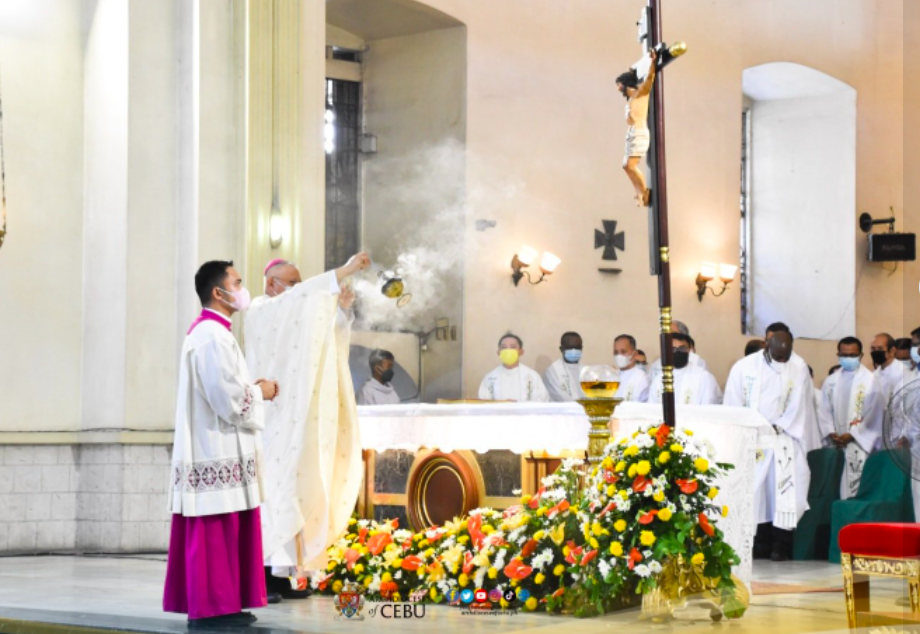Faith on trial: Cebu clergy abuse case divides public opinion

Cebu Archbishop Jose Palma celebrates the Mass commemorating the feast day of St. Joseph at the National Shrine of St. Joseph in Mandaue City. | Photo courtesy of the Archdiocese of Cebu
CEBU CITY, Philippines — An online database tracking sexual abuse cases involving Catholic clergy recently identified at least 10 priests with ties to Cebu accused of sexually abusing minors.
The database, maintained by the US-based advocacy group BishopAccountability, listed 82 clerics from the Philippines accused of sexual abuse.
Among those named, three priests incardinated in the Archdiocese of Cebu—Benedicto Belciña, Raul Ejares, and Leo Operiano—remain in active ministry.
The accusations against these priests date back several years: Belciña was charged with rape in 2006; Ejares faced accusations of lascivious conduct, also in 2006; and Operiano was accused of molestation in 2015.
READ: Palma on accused Cebu priests: They were cleared to return to ministry
Archdiocese of Cebu confirms findings
On January 30, the Archdiocese of Cebu confirmed the presence of three active priests on the list.
In a statement, Cebu Archbishop Jose Palma assured the faithful that these priests had undergone both civil and canonical processes and were deemed fit to return to ministry.
“They have gone through the required legal and canonical processes in the past and have been determined by competent civil and ecclesiastical authorities as fit to return to active ministry, but with continued guidance and supervision,” Palma said.
The archdiocese stated their reintegration was based on thorough investigations and legal clearances. However, the statement did not sit well with some members of the public, who questioned whether ecclesiastical processes could truly address such grave offenses.
Public outcry and divided opinions
The news triggered an immediate wave of reactions online, with netizens expressing a wide spectrum of opinions. Many called for accountability and justice, while others urged compassion and prayers for the clergy.
Carmel Grace, a devout Catholic, expressed the need for accountability within the Church:
“As a practicing Catholic, I have deep respect for priests, but I must also say, please hold them accountable if they have become harmful to society.”
Others, like Roy Deiparine, highlighted the human frailty of priests:
“They are also human, subject to commit sin… It is just RIGHT that they have to be punished, and they KNOW it.”
Manoy Diyan, meanwhile, urged continuous prayers for the clergy:
“The more we need to pray for our priests. They are human beings and also vulnerable. Let us keep praying for them.”
However, not everyone shared this sentiment. Critics were quick to point out that prayers alone are insufficient in the face of grave crimes. Jett Escario voiced his frustration:
“They should be held accountable like normal people. Since they’re ‘just human,’ then they need more than prayers. Imprison them and remove their priesthood as punishment.”
Alice Sacay-Siccion’s call to include priests in daily prayers sparked backlash from other netizens. Roldan Ancajas dismissed the idea:
“No amount of prayers can help a congenital fornicator. The excuse that they are ‘just human’ is highly misused, abused, and overused.”
Others, like Sora Ong, shifted the focus to the victims:
“Pray for the victims instead. They need it more than the abusers.”
‘Spotlight’ and calls for transparency
Some netizens drew comparisons to the 2015 Oscar-winning film Spotlight, which chronicled The Boston Globe’s investigation into systemic sexual abuse and cover-ups within the Catholic Church.
The case of Fr. John Geoghan, who molested over 80 boys, served as a chilling reminder of the global scope of such scandals. Like in Spotlight, questions about institutional cover-ups and accountability loom large in Cebu’s unfolding story.
Jay Ram questioned the integrity of the Church’s internal investigations:
“Cleared. Really? By whose standards? The Church’s? If so, those standards can be challenged in Civil Courts.”
Helen Domocol expressed skepticism about rehabilitation for clergy sex offenders:
“No such thing as a reformed sex offender priest. If the sanctity of their office didn’t stop them, nothing will.”
Call for legal accountability
Netizens like Cristina Lao noted the need for legal action.
“File a case against them if there’s enough evidence. Nobody is above the law.”
While the Catholic Church faced scrutiny for its handling of sexual abuse cases, many Catholics struggled to reconcile their faith with the institution’s failures.
The reintegration of accused priests, despite assurances of due process, raises concerns about transparency and the weight given to victims’ experiences.
The Church’s efforts to rehabilitate these priests must be balanced with the need for justice and the protection of vulnerable individuals.
Archbishop Palma’s assurance that the priests remain under continued guidance and supervision is a step toward accountability. However, whether this will be enough to restore public trust remains uncertain.
The voices of critical yet compassionate netizens reflect a society grappling with complex questions of accountability, forgiveness, and justice. As one commenter aptly put it:
“No institution, not even the Church, should be beyond scrutiny.”
/clorenciana
Disclaimer: The comments uploaded on this site do not necessarily represent or reflect the views of management and owner of Cebudailynews. We reserve the right to exclude comments that we deem to be inconsistent with our editorial standards.
